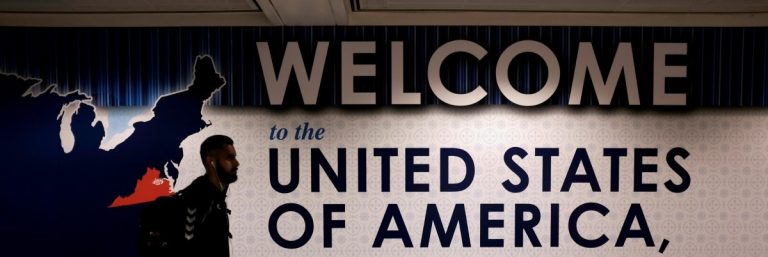
United States President Donald Trump’s third try to block citizens of certain countries from entering the US has been temporarily blocked by a federal judge on Tuesday, just one day before it was set to take effect.
This means the latest travel ban, announced last month targeting people from Iran, Libya, Syria, Yemen, Somalia, and Chad, will not take effect nationwide on Wednesday, Reuters reported.
The ruling for a temporary restraining order against the third version of the president’s travel ban said the ban discriminated by using the nationality of travelers “as a proxy” for their security risk.
US District Judge Derrick Watson in Honolulu called the ban “detrimental to the interests of the United States” and “discriminatory”, as well as “suffering from the same maladies as its predecessor”, according to CNN.
BREAKING: Federal judge blocks Trump travel ban just hours before it was to take effect. https://t.co/EpU9xIrkVH pic.twitter.com/ZefmlqmbcZ
— The Boston Globe (@BostonGlobe) October 17, 2017
Watson said the administration has failed to prove that the entry of nationals for the six specified countries would be “detrimental to the interests of the United States”.
Federal immigration laws “do not afford the President unbridled discretion to do as he pleases,” the judge said.
The state of Hawaii had sued to block this latest travel ban on six of the countries listed, except North Korea and Venezuela.
The first ban, issued Jan 27, caused chaos and protests at US airports as it was announced without prior warning. Judges later halted the ban that would’ve barred entry to the US for those from seven majority Muslim countries, then including Iraq and Sudan.
A revised order a few months later dropped Iraq from the list of countries barred and gave additional reasons why the remaining countries are not allowed entry into the US, sparking further legal suits. Judges at these two prior attempts have said the travel bans were motivated by a bias against Muslims.
For this third try, many expect it will again reach the US Supreme Court, as the previous two have.
The White House said the Honolulu ruling was “dangerously flawed” and undercuts Trump’s efforts to keep US nationals “safe” and “enforce minimum security standards for entry into the United States”.
The Justice Department described Watson’s ruling as “incorrect” and that it would appeal “in an expeditious manner.”
Liked this? Then you’ll love these…
Despite travel ban, foreign students still want to go to the US – study
Revised travel ban shouldn’t bar foreign students… in theory – experts







